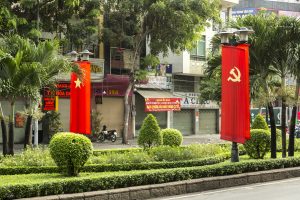Vietnamese authorities have arrested the assistant to National Assembly Chairman Vuong Dinh Hue, a hint that the country’s ongoing anti-corruption campaign could lead to blood-letting at the upper echelons of the government.
The Ministry of Public Security yesterday detained Pham Thai Ha, who also serves as deputy head of the National Assembly office, for “abusing his position and power to influence others for personal gain,” Radio Free Asia reported, citing a Vietnamese-language state media report.
According to a report by VnExpress, Ha’s arrest is connected to an investigation into bribery and illegal bidding for construction projects in Bac Giang province.
The bidding involved the Hanoi-based Thuan An Corporation, whose chairman Nguyen Duy Hung was arrested on April 15 for “violating regulations on bidding causing serious consequences” and “giving bribes.” Two other executives from the firm, and two members of Management Board of Construction Investment Projects for Transport and Agricultural Works in Bac Giang province have also been arrested in connection with the investigation.
Ha, who holds a PhD in economics, was appointed deputy head of the National Assembly Office and assistant to the National Assembly chairman in May 2022. Ha’s arrest is the latest connected to the “blazing furnace” anti-corruption campaign that has swept through the political and business communities over the past eight years, leading to the arrest, firing, and forced resignation of hundreds of party and government officials.
The campaign has recently intensified, creating an unusual instability at the upper ranks of Vietnamese politics. Last month, President Vo Van Thuong was forced to step down a little over a year after he replaced Nguyen Xuan Phuc, who himself resigned in connection with corruption scandals in early 2022. This drama has played out in parallel to one of the country’s highest-profile corruption trials in years, which came to a conclusion last month when one of Vietnam’s richest businesspeople was sentenced to death for orchestrating a $12 billion fraud, with the connivance of bank regulators and other civil servants.
In this context, Ha’s arrest will inevitably cast a shadow over the political prospects of his boss Hue, who was appointed to March 2021, shortly after the Communist Party of Vietnam (CPV)’s last Party Congress. He has been tipped as a possible successor to Nguyen Phu Trong, the ageing general secretary of the CPV, at the next Congress in early 2026.
The signs for Hue are not good. The recent resignations of senior officials, including Thuong, have often been preceded by the arrests of their subordinates, clients, and business associates. (According to one report, Hung, the detained chairman of the Thuan An Corporation, is a relative of Hue.) Since Thuong’s resignation last month, there have been rumors that other senior officials would soon be in the firing line of anti-corruption investigators.
The removal of the National Assembly chair, one of the “four pillars” of the Vietnamese political system – the others are the presidency, the prime ministership, and the position of general secretary of the CPV – would once have seemed unthinkable, or at least highly unusual, in a political system where factional in-fighting is kept behind a veil of secrecy. But the extent of the recent shake-ups at the top of Vietnamese politics, driven by a complex mix of principled and political motives, means that nothing can be ruled out, no official deemed fully safe from the swing of the axe. At the very least, with the arrest of his main assistant, Hue’s chances of gaining the leadership of the Party in 2026 seem to be fading fast.

































